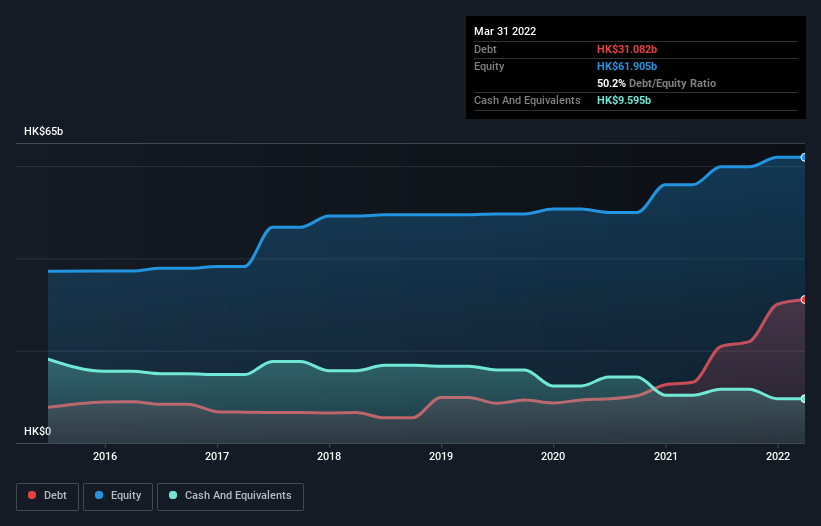- Hong Kong
- /
- Water Utilities
- /
- SEHK:270
We Think Guangdong Investment (HKG:270) Is Taking Some Risk With Its Debt

Legendary fund manager Li Lu (who Charlie Munger backed) once said, 'The biggest investment risk is not the volatility of prices, but whether you will suffer a permanent loss of capital.' When we think about how risky a company is, we always like to look at its use of debt, since debt overload can lead to ruin. We can see that Guangdong Investment Limited (HKG:270) does use debt in its business. But the real question is whether this debt is making the company risky.
What Risk Does Debt Bring?
Debt and other liabilities become risky for a business when it cannot easily fulfill those obligations, either with free cash flow or by raising capital at an attractive price. Ultimately, if the company can't fulfill its legal obligations to repay debt, shareholders could walk away with nothing. However, a more frequent (but still costly) occurrence is where a company must issue shares at bargain-basement prices, permanently diluting shareholders, just to shore up its balance sheet. By replacing dilution, though, debt can be an extremely good tool for businesses that need capital to invest in growth at high rates of return. When we think about a company's use of debt, we first look at cash and debt together.
See our latest analysis for Guangdong Investment
What Is Guangdong Investment's Net Debt?
The image below, which you can click on for greater detail, shows that at December 2021 Guangdong Investment had debt of HK$31.1b, up from HK$13.1b in one year. On the flip side, it has HK$9.60b in cash leading to net debt of about HK$21.5b.

How Strong Is Guangdong Investment's Balance Sheet?
Zooming in on the latest balance sheet data, we can see that Guangdong Investment had liabilities of HK$37.2b due within 12 months and liabilities of HK$30.9b due beyond that. On the other hand, it had cash of HK$9.60b and HK$5.89b worth of receivables due within a year. So it has liabilities totalling HK$52.6b more than its cash and near-term receivables, combined.
This deficit is considerable relative to its market capitalization of HK$65.5b, so it does suggest shareholders should keep an eye on Guangdong Investment's use of debt. Should its lenders demand that it shore up the balance sheet, shareholders would likely face severe dilution.
We use two main ratios to inform us about debt levels relative to earnings. The first is net debt divided by earnings before interest, tax, depreciation, and amortization (EBITDA), while the second is how many times its earnings before interest and tax (EBIT) covers its interest expense (or its interest cover, for short). Thus we consider debt relative to earnings both with and without depreciation and amortization expenses.
We'd say that Guangdong Investment's moderate net debt to EBITDA ratio ( being 2.2), indicates prudence when it comes to debt. And its commanding EBIT of 27.8 times its interest expense, implies the debt load is as light as a peacock feather. Guangdong Investment grew its EBIT by 2.6% in the last year. That's far from incredible but it is a good thing, when it comes to paying off debt. When analysing debt levels, the balance sheet is the obvious place to start. But it is future earnings, more than anything, that will determine Guangdong Investment's ability to maintain a healthy balance sheet going forward. So if you're focused on the future you can check out this free report showing analyst profit forecasts.
Finally, a company can only pay off debt with cold hard cash, not accounting profits. So the logical step is to look at the proportion of that EBIT that is matched by actual free cash flow. During the last three years, Guangdong Investment burned a lot of cash. While that may be a result of expenditure for growth, it does make the debt far more risky.
Our View
Neither Guangdong Investment's ability to convert EBIT to free cash flow nor its level of total liabilities gave us confidence in its ability to take on more debt. But its interest cover tells a very different story, and suggests some resilience. It's also worth noting that Guangdong Investment is in the Water Utilities industry, which is often considered to be quite defensive. When we consider all the factors discussed, it seems to us that Guangdong Investment is taking some risks with its use of debt. So while that leverage does boost returns on equity, we wouldn't really want to see it increase from here. The balance sheet is clearly the area to focus on when you are analysing debt. But ultimately, every company can contain risks that exist outside of the balance sheet. For example - Guangdong Investment has 1 warning sign we think you should be aware of.
At the end of the day, it's often better to focus on companies that are free from net debt. You can access our special list of such companies (all with a track record of profit growth). It's free.
New: Manage All Your Stock Portfolios in One Place
We've created the ultimate portfolio companion for stock investors, and it's free.
• Connect an unlimited number of Portfolios and see your total in one currency
• Be alerted to new Warning Signs or Risks via email or mobile
• Track the Fair Value of your stocks
Have feedback on this article? Concerned about the content? Get in touch with us directly. Alternatively, email editorial-team (at) simplywallst.com.
This article by Simply Wall St is general in nature. We provide commentary based on historical data and analyst forecasts only using an unbiased methodology and our articles are not intended to be financial advice. It does not constitute a recommendation to buy or sell any stock, and does not take account of your objectives, or your financial situation. We aim to bring you long-term focused analysis driven by fundamental data. Note that our analysis may not factor in the latest price-sensitive company announcements or qualitative material. Simply Wall St has no position in any stocks mentioned.
About SEHK:270
Guangdong Investment
An investment holding company, engages in water resources, property investment and development, department store operation, hotel ownership, energy project operation and management, and road and bridge operation businesses.
Good value with adequate balance sheet and pays a dividend.


